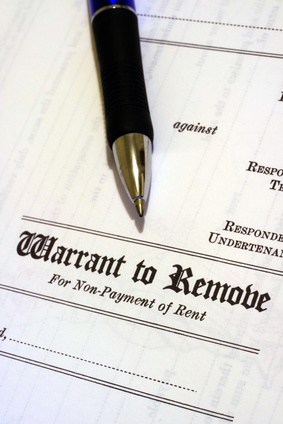Most landlords will face the unpleasant prospect of having to evict a tenant at some point for one reason or another. The reasons for the eviction are of course important, but not nearly as important as taking the correct legal steps to remove the tenant. The process can be daunting and time consuming.
Never Try it on Your Own
The temptation to attempt to handle an eviction on your own is great–the Internet is full of “advice,” free downloadable forms for you to send your tenant, and lots of general information. Most of it is just wrong. Before you start printing free forms, be reminded of one thing–you get what you pay for. In the Nassau and Suffolk County courts, those forms usually have no legal value, and may only serve to keep the tenant in your property even longer.
You can also go to the Court System’s website and download the forms you need to begin an eviction proceeding, but landlord-tenant law is so highly technical that even having the correct forms is not enough. You need to understand the law and the procedure involved. Without that understanding, even the correct forms may be useless. And the staff at the courthouses in Nassau and Suffolk County are prohibited from giving you legal advice, so you really will be on your own and overwhelmed.
There are many aspects of landlord-tenant law in New York, and the courts recommend that you retain an eviction lawyer to remove a tenant. Understanding the law, your rights and responsibilities, as well as the tenant’s rights and responsibilities, is the key to an expedient and effective eviction.
How the Eviction Process Works
Before your eviction lawyer can start proceedings against a tenant, he or she will need a copy of your written lease agreement, if there is one. Many lease agreements contain predicate notice requirements that must be met before you can start legal action. An experienced eviction lawyer will read the lease to ensure that you have met all such notice requirements.
Many Nassau and Suffolk County landlords do not have written lease agreements with their tenants. If this is your situation, and your eviction is to be based on non-payment of rent, you still need to send a notice to the tenant letting him know that you have not received the rent within 5 days of its due date; and arrange to have a fourteen-day notice to pay or quit served on the tenant.
There are two kinds of eviction proceedings: non-payment, which is self-explanatory, and hold over, which is for persons who are tenants without an active written lease agreement for a term that has not expired, or persons who are not tenants, e.g., licensees, squatters, etc.
Non-Payment Eviction
If your tenant simply does not pay the agreed amount of rent, then you have the right to evict him or her. If the tenant pays all of the rental arrears and becomes current in the rent on or before the court date, the case will generally be dismissed and the tenant will remain in possession of the property. If you are willing to accept the potential for this outcome, then a non-payment proceeding may be right for you.
Hold-Over Eviction
Two things have to be in effect for a hold-over proceeding:
1. Non-payment of rent is NOT the primary grounds for a the eviction.
2. There is no written lease in effect for a term not yet expired.
In other words, if the term of your tenant’s written lease agreement has not yet expired, you generally cannot evict him or her unless the tenant stops paying rent. If your agreement is oral, however, then the tenancy is “at will” or “by sufferance,” You can terminate such a tenancy by giving the tenant 30-days written notice. Thereafter, you can start a hold-over eviction to remove the tenant.
Hold-over evictions traditionally take a little longer than non-payment evictions because of the requirements of the 30-day written notice.
Steps to an Eviction
There a several trips to the courthouse in an eviction proceeding and every case is different, but these are the basics.
Serve an appropriate predicate notice. This lets the tenant know that he or she must do something within a specified time period, or an eviction action will begin.
File and serve a Notice of Petition with Petition in the appropriate court.
Appear in court on the date the petition is noticed to be heard. (In other words, the court date).
On prevailing, file an application for the Court to issue you a judgment. If money has been awarded, also request a transcript of judgment (this costs $6) and a warrant of eviction for the Sheriff to come and physically remove the tenant.
Now that your tenant has been legally evicted from the property, you must ensure that he or she actually leaves. Getting them out sooner than later is in your best interest, as some evicted tenants do things to retaliate against their landlord. At this juncture you should ask the Nassau or Suffolk County Sheriff’s office to execute your Warrant of Eviction and remove the tenants. They will serve a 14-day notice to vacate, and after that period they will physically remove the tenants. If the tenant causes any damage above their security deposit, you may start additional legal proceedings to recover the amount of the damages.
Chances are good that you may not be repaid, i.e., that you may not recover the amount of your judgment, but a judgment will remain on the tenant’s credit report for up to 7 years and can be enforced for up to 20 years.
Why You Need an Eviction Lawyer
Evicting a tenant is time-consuming and takes precise attention to the New York landlord-tenant statutes, which is why you need an experienced attorney to represent you. At the Murtha Law Firm, LLC, we have many years of experience in working with landlords to resolve tenant issues. Our flat fee covers all the expenses you would incur if you tried to evict on your own, including filing fees, process server fees, and transcripts of judgment. We take care of all of that for you – and we will appear in court with you to make sure you get the relief you need. We will make sure you get everything you need to have the Sheriff’s Office remove the tenant.
Most landlords in Nassau and Suffolk County are homeowners who are renting an accessory apartment to a single individual or small family, and in some cases are not permitted to do so because of a town or other municipal code. If you are one of those landlords and are concerned that leasing part of your home without permission prohibits you from evicting a tenant, do not despair. Well settled appellate court decisions have held that tenants must pay rent, regardless of local laws requiring the landlord to obtain a permit to rent the unit; further decisions have held that landlords who rent one or even two units are not running afoul of the Multiple Dwelling Law and are not prohibited from collecting rent.
An experienced eviction attorney knows the laws, and how they are applied–an eviction attorney is well worth the investment when you need to get rid of a problem tenant. Call us for a free consultation today. We can begin the process of removing your tenant as soon as we are retained.







Thanks for the tip that non-payment is still ground for me to hire an eviction attorney for legal action against a tenant. I’m currently studying up on passive income through home rentals because I’m planning to invest in real estate soon. I think I should start looking into eviction attorneys so that I have someone to consult once I start having tenants.